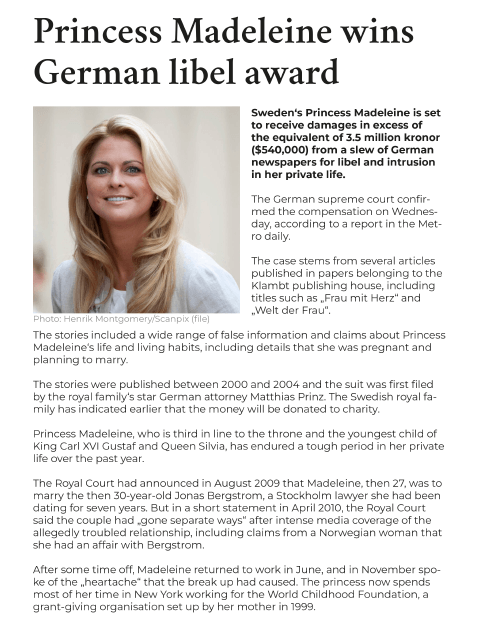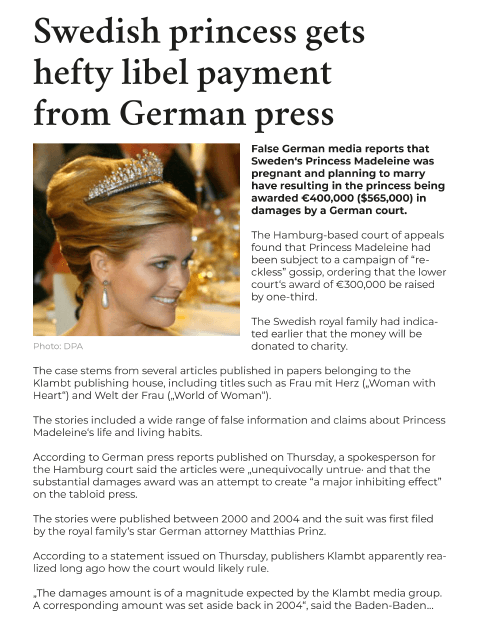Law Office
FAQ
- Claims & Strategies
- Counterstatement
- Injunctive Relief
- Rectification
- Damages & Enrichment
- Press Complaint
- Criminal Charge
- Strategic Considerations
FAQ
Claims and Strategies in Media Law
Injunctions, cease and desist letters:
Some PR specialists do not want anything to do with this as it interferes with their nice relationship with editors and journalists.
Chief executives, who are annoyed by media reports, often see this differently. They want to demonstrate that they can defend themselves. Both positions have their strong points. If you are too nice and allow yourself to be pushed around you will not be taken seriously. However, you must expect that the media will take revenge if you start legal action.
The legal possibilities must be understood and implemented as an effective option within the context of communication. To correctly assess the prospect of success and take the correct decision, one should at least know about the legal options.
Counterstatement/Gegendarstellung
The right of reply provides an opportunity to contradict a report in the media. The counterstatement is a statement by the affected party regarding an already published untrue allegation of fact. An example: "On the 30 03 2020 newspaper X an allegation was published on Page 27 of newspaper X that we accepted bribes from Y. This allegation is untrue. What is correct is that we did not receive any payments from Y."
Replies are permitted only against the publication of facts, but not to the expression of an opinion. The following counterstatement is therefore inconceivable: "On 30 03 2020, it was published on Page 27 of newspaper X that our football team had played badly on Saturday. This is not correct. The team played well." Whether one is dealing with a fact or an expression of opinion is sometimes difficult to determine.
The counterstatement is drafted by the affected party or his attorney. It is then sent to the opposing party with a request to immediately print it. This delivery must be done "without delay", which regularly means within a period of 10 days of becoming aware of the reporting. If the required counterstatement is not voluntarily printed, the publication can be enforced via a court order, if the formalities have been followed correctly. The Landgericht (Regional Court) in whose jurisdiction the media company is based, has jurisdiction. The falsehood does not have to be proved or substantiated. However, the counterstatement must also not be "obviously untrue". A considerable drawback of the counterstatement is that the reporting, to which one objects, must be repeated within the context of the counterstatement. The counterstatement therefore often attracts more attention than the original reporting. Sometimes the formulations are so formalistic that the counterstatement defeats the desired purpose.
However, a counterstatement can be a good choice if the original article was amonced on the frontpage. The counterstatement has to be printed on the frontpage in comparable size to show all potential readers that the story was originally wrong.
Injunctive Relief
The injunctive relief may stop or prevent unlawful reporting. It is therefore of specific practical importance. An injunction can provide fast and effective protection from imminent damage. The injunctive relief may address both unlawful texts and impermissible photos or film. The injunctive relief is available in the event of written reporting not only to protect somebody against false allegations of facts but – in cases of privacy invasion – also against the expression of opinion.
With a cease and desist order of the court a media company can be prohibited from distributing illegal content. The interim injunction actually only acts as an interdict against the media company that has already published or is about to publish something. However, the interim injunction can also play a big part in communication. Referring to the already granted interim injunction, one can prevent other media from subsequent reporting. Equally, one can convince other media that the original reporting was false. Once an interim injunction has been granted it may cause corrective reporting in other media if it makes tactical sense. Because of the urgent enforcement in the injunctive process, the positive effects mentioned are quickly obtained both in cases of a cease and desist order and the counterstatement.
Rectification/Widerruf
A rectification, i. e. a withdrawal or a correction, is the statement by the media company that the published article contained a false statement of facts.
An example:
"On the 30 03 2020, we have published on Page 27 that A accepted bribes from B. This allegation was untrue. A did not receive any payments from B."
A claim for rectification is only valid in the case of false allegations of facts. There is no rectification in case of an expression of opinion.
In practice, rectification statements are rarely seen. The reason is that they cannot be enforced in interim rectification proceedings but only in a principal claim. The rectification claim therefore is not well suited to the quick solution of a problem.
Damages for Pain and Suffering, Damages and Enrichment
The claim for damages is aimed at the replacement of losses actually incurred. A loss might consist of somebody losing his employment due to unlawful reporting, thus suffering from loss of income. Similarly, expenses for the prosecution and legal lawyer's fees are possibly recoverable.
The pecuniary compensation claim ("compensation for personal suffering") serves to compensate for intangible damage. There is a claim to pecuniary compensation in cases of gross violations of the personal rights; If the damage cannot be compensated satisfactorily otherwise. The pecuniary compensation is based on the reasoning that – without such a claim – violations of human dignity and honour often remain unsanctioned with the result that the legal protection of the personality would suffer. The important aspects are satisfaction and prevention. Whether a gross violation of the personal rights has occurred depends on the circumstances, such as the affected private sphere, the long-term effects of the damage, the cause and motive of the tortfeasor and the degree of its culpability. The recently awarded amounts – depending on the severity of infringement – range from approximately 5,000 Euro to 400,000 Euro.
Complaint before the Press Council
Anybody may complain to the Press Council against newspapers and magazines that violate personal rights, and, since the 1st of January 2009, also against journalistic and editorial contributions from the internet provided it does not concern broadcasting.
Associations and unions are also entitled to complain. The complaint is free of charge. However, in practice, the complaint is of little relevance.
Criminal Charge
We only rarely recommend the initiation of criminal investigations. Investigation proceedings for libel or defamation (Sections 185 et sequ. StGB – criminal code) usually take too long and rarely end in a conviction.
Strategic Considerations
When proceeding against media reports that violate personal rights, strategic considerations play an important part beside the legal and procedural aspects. How and in which court interim injunctions are enforced or legal proceedings started is one aspect, the other aspect is, which available steps are taken if any at all.
The consideration starts with the important question: What is the prospect of success? Cases that are likely to be lost should not be tried. This sounds trite, but in practice it is often difficult to talk irate parties out of lawsuits which they will not win. However, there are also proceedings that are certain to be won but should still not be tried. There are many reasons for this: Mainly, because the lawsuit attracts new media attention. Or because a dangerous opponent is being "trodden into the ground" to such an extent, that he/she will inevitably "take revenge". However, often one has to go to court: If the reporting is false or taken up by other media. Equally, if the reporting causes persistent damage, a clear indication of defence must usually be given.
Each case is different and requires specific strategies. Diverse problems need diverse problem-solving approaches. Legal steps are always an important option, but not in all cases the correct means.
Further information about the law firm
Prinz Lawyers
Contact
For general inquiries: office@prinzlaw.com
All contact information and a contact form can be found on our contact page: Contact Page





